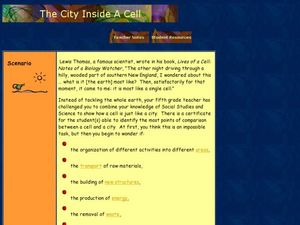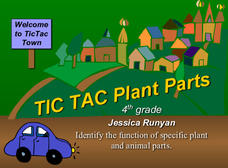Biology Junction
Plant Diversity
Ginkgo trees existed for more than 350 million years, and, at this time, only one species still remains. While plant diversity generally increases over geologic time, some interesting exceptions occur. Young scientists learn about plant...
Curated OER
Tour of the Cell 1
Each of these slides deals with an individual organelle and displays a diagram along with labels of the structures. The most useful components of this slideshow are the summaries of functions and descriptions of how the organelles are...
Curated OER
Discovering Cells
Students will learn about the pioneers who discovered the cell and its parts. They will be able to relate advances in microscope technology to the discoveries. Students diagram a time line and answer questions at the end to check for...
Curated OER
Cell Observation Exercise
Students take measurements of the distance between the objective and the slide when in focus with each objective. They determine the diameter of the field of view at each power in order to determine the size of the cells being observed.
Curated OER
Cell Cookie Lesson Plan
Students review the structure and fuctions of plant and animal cells. They use various types of materials such as sugar cookies and cake frosting for this instructional activity.
Grand Erie District School Board
Model Cell Project
If you're finishing up a unit on cells, here's a great project to get kids collaborating and recalling what they've learned in a fun and tangible way. Small groups create plant or animal cells out of materials they have at home. They use...
Curated OER
The City Inside a Cell
Learners compare cell structure to the structure of a city. In this cell structure lesson, students investigate differences and similarities between cell structure and city structure. Learners create a 3-dimensional, edible model of a cell.
Curated OER
Observing Specialized Cells
In this plant and animal cell worksheet, students draw five examples of plant or animal cells that are specialized to perform a particular functions. They also complete 6 short answer questions based on their observations.
Curated OER
Cellular Models
Each student construct a model of a cell on a large cookie, including the parts which were discussed during lecture.? Half of the class will be instructed to make plant cell models and the other half will be in charge of animal cell...
Curated OER
The Virtual Electron Microscope
Students explore the world of the very small using a Flash plug-in Virtual Electron Microscope. They complete and discuss an activity in which unknown samples are placed under the computer simulated microscope to determine where the...
Curated OER
Cells, Cells, Cells
Students explore plant and animal cells. Using household items, students create a three-dimensional model of a plant or animal cell. Students identify and label each cell part.
Curated OER
Cell Structure and Function
Students discuss scientific advances brought about by the Mars Surveyor Space Program which impact on daily life, identify laboratory apparatus like microscopes, slides and coverslips, and use the microscopes to view cells and organisms.
Curated OER
Cell Study
Students (females) are introduced to the cell. They discuss what a cell is, and students define what a cell is. Students comprehend that all living things are made up of cells. They comprehend that life is defined as something that...
Curated OER
Cell Organelles
Students explore biology by researching living cells. In this living organism lesson, students participate in a role-playing activity in which all the students in class form one plant cell by portraying specific parts of a cell. Students...
Curated OER
Those Cells Look Good Enough to Eat
Pupils explore the parts of the cell. In this cell lesson plan, students use foods to create cell models that represent the nucleus, cytoplasm, cell membrane, mitochondria, ribosomes, vacuoles, endoplasmic reticulum, and Golgi bodies...
Curated OER
Plant Parts
In this plant parts instructional activity, students read for information and demonstrate comprehension. In this true and false, fill in the blank, short answer, and multiple choice instructional activity, students answer ten questions.
Curated OER
Comparing Plant and Animal Cells
For this comparing plant and animal cell worksheet, students use a microscope to observe cheek cells and onion cells. They compare their observations and answer 3 questions about their discoveries.
Curated OER
Tic Tac Plant Parts
This plant biology PowerPoint introduces plant parts and their functions. This PowerPoint allows students to identify each plant part on a diagram, along with its' function. The slides contain a clear explanation of how each plant part...
Carnegie Mellon University
Understanding Electricity Mix Tradeoffs
Use the accompanying presentation and colorful technology sheets to introduce your class to the 10 different energy technologies. Connect kids to an interactive computer tool that allows them to combine different types of power...
Curated OER
Cells are 3-D!
Students design three dimensional models of plant and animal cells. They identify the cells parts, and compare animal and plant cells.
Curated OER
Introductory Bacteria and Virus Worksheet
Compare and contrast eukaryotes, prokaryotes, and viruses with a chart and a Venn diagram. Beginning microbiologists consider motility, reproductive ability, DNA content, and the presence of organelles. They write short answers to...
Curated OER
In Cell-A-Bration of Cells
Sixth graders identify major cell organelles found in both animal and plant cells. Pupils observe a PowerPoint presentation based upon the features of a haiku. They create haiku science-based poem which describe the characteristics of...
Curated OER
Cell 7 Plant v Animal Cells
Students differentiate between plant and animal cells. They identify the structures central to plant cells. They complete a Venn Diagram listing the differences between animal and plant cells.
Curated OER
Benefits of Indoor Plants
Students diagram a plant. In this Science lesson, students explore the concept of photosynthesis focusing on the oxygen production. Students calculate the amount of plants needed to filter the air in their classroom.























